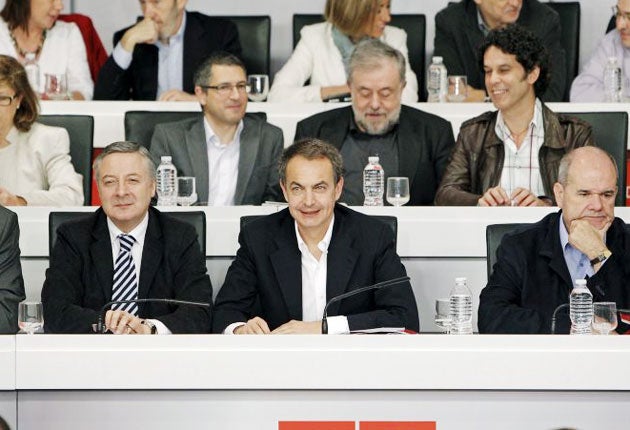Spain's prime minister won't seek third term

Spain's embattled socialist prime minister announced Saturday he will not seek re-election in 2012 as his country grapples with debt, high unemployment and a faltering economy badly hit by the international financial crisis.
Jose Luis Rodriguez Zapatero told a meeting of party leaders he would limit his time in office to two terms, opening a process of primaries to elect his successor, though analysts say the Socialists are almost certain to lose next year unless the troubled economy improves substantially.
He made the announcement after a series of polls over the last year showed the center-right Popular Party far in the lead after Zapatero and his administration enacted a host of austerity measures aimed at preventing Spain from being forced to accept a bailout.
Zapatero insisted in his speech that the measures, including tax hikes and law changes making it easier to fire workers, have stabilized Spain's shaky economy, then announced that he "will not be a candidate in the forthcoming general elections." He also said his decision is best for the country, his party and his family.
Zapatero, 50, was elected to office just days after the March 11, 2004 terror attacks on Madrid's commuter train system that left 191 dead and 1,800 injured.
In the lead-up to the 2004 election, conservative Prime Minister Jose Maria Aznar initially blamed the explosions on the Basque armed separatist group ETA, but a subsequent police investigation concluded it was an Islamist attack. There was also a wave of public disapproval of the Aznar government's involvement in the Iraq war.
At the time, Spain's economy was one of the most dynamic in Europe, recording astounding growth for a decade amid a construction boom.
Boom turned to bust starting in 2008 amid the financial crisis which has hit Spain especially hard. One out of every five Spanish workers is now jobless — the 20 percent unemployment rate is the worst in the eurozone — while analysts augur grim economic growth prospects.
The Socialist party is widely expected to suffer steep losses in regional and municipal elections May 22 before general elections in 2012.
The most likely successors to Zapatero as party leader are Deputy Prime Minister and Interior Minister Alfredo Perez Rubalcaba, and Defense Minister Carme Chacon, who would become Spain's first female premier if elected.
A tired-looking Zapatero told party leaders he was convinced when he first took office that two terms as leader of the government was enough, and that nothing had changed his outlook.
The announcement came a week after Spanish business and banking leaders told Zapatero that speculation about whether he would run or not could hurt the economy, though Zapatero did not refer to that event in his speech.
The Socialists have until March to choose their new candidate, and the date of the election won't be set until later next year.
Rubalcaba, 59, has vast political experience in Spain and has held ministerial posts in two governments since 1993 when he became minister of education and spokesman for the then government.
He is also Zapatero's right-hand man in the government's crackdown on ETA. The violent group has been severely weakened by a series of arrests over the last few years, and declared what it has called a "permanent cease-fire" in January.
Chacon, 40, previously served under Zapatero as housing minister and now has a prominent position overseeing Spain's troops in Afghanistan and its participation in enforcement of the no-fly zone and naval blockade of Libya.
Recent polls show the Socialist party about 13 percentage points behind the PP and analysts say reducing that gap will be extremely difficult unless the economy bounces back strong, while economic analysts predict very slow growth for Spain.
"Can the economy recover? That's the million dollar question," said Ramon Cotarelo, a political science professor at Madrid's Complutense university. "Thirteen points difference in the polls is a vast amount and if the economy maintains its current performance it is going to be very difficult for the Socialists to overcome it."
The PP is widely expected to field leader Mariano Rajoy as its candidate next year. He did not immediately comment Saturday on Zapatero's decision, but the party said in a statement that Zapatero's government should call early elections this year instead of waiting next year.
Over the past year, the PP has continually called on the Socialist party to hold early elections so the country can be given a chance to replace what Rajoy has called "a disastrous government."
Join our commenting forum
Join thought-provoking conversations, follow other Independent readers and see their replies
Comments